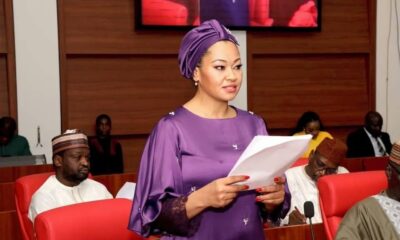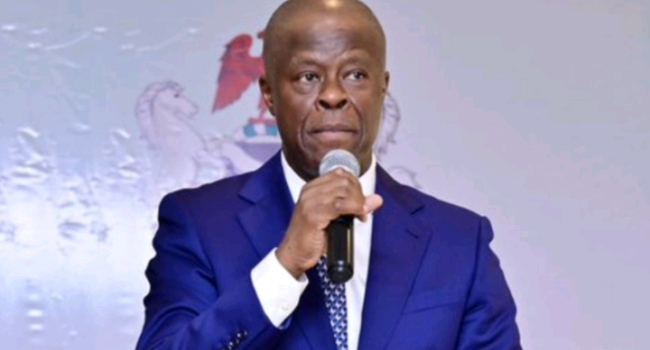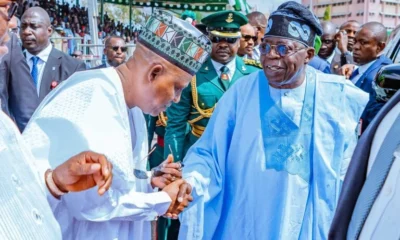The Minister of Finance, Wale Edun, stated that the Federal Government intends to enhance non-oil revenue as part of efforts to mitigate the negative consequences of trade tariffs imposed by President Donald Trump.
Edun also mentioned that the Economic Management Team (EMT) would convene to evaluate the potential effects of the “14 per cent tariff” on Nigerian exports to the United States.
He explained that the team would subsequently propose strategies to soften the blow to the nation’s economy.
Speaking at a Ministry of Finance Incorporated (MOFI) event on Monday, Edun pointed out that while the main challenge for Nigeria would stem from a potential drop in oil prices, the government is working to increase oil output and improve non-oil revenue.
The Trump administration recently introduced a range of tariffs, from “10 per cent and 65 per cent”, on exports from various countries, including a “14 per cent tariff” on Nigerian exports to the US.
Responding to journalists’ questions during the MOFI Corporate Governance Forum, Edun noted that the US had, as of April 2, exempted mineral exports, such as oil.
“Therefore, it’s the price effect, the oil price effect that may affect Nigeria. And it is the job and responsibility of the economic management team of President Bola Ahmed Tinubu, amongst others, to look at the various scenarios that might play out.
“There’s global uncertainty at a huge level, so nobody knows exactly what will happen– the announcement that has been made. We’re not sure what will be delayed, what will be reversed, or what will be implemented.
“So, it is not an announcement that the budget is being reviewed. It’s an announcement that it is our responsibility to look at the various scenarios and options and advise government accordingly.”
In his keynote speech at the event titled “Ensuring Value Creation in State Owned Enterprises Through Better Corporate Governance,” Edun outlined plans to consider budget restructuring, prioritisation of spending, and creative non-debt financing approaches.
He revealed that Nigeria has maintained a trade surplus with the US over the past three years (2022-2024).
“Nigeria-US Trade has been in surplus in the last 3 years (2022-2024). Nigeria’s exports to the US were N1.8 trillion, N2.6 trillion and N5.5 trillion in 2022-2024, respectively.
“Fortunately, oil and mineral exports accounted for 92 per cent. Implying oil and minerals exports amounted to N5.08 trillion in value while non-oil was just N0.44 trillion
“Consequently, the tariff effect on exports is negligible if we sustain our oil and minerals export volume.
“The adverse effect on Nigeria will be through oil price plunge. We are intensifying efforts to ramp up crude oil production to curtail any price effect.
“We are also focusing on non-oil revenue mobilisation by FIRS and Customs, budget adjustment and prioritisation where possible, and also and innovative non-debt financing strategies,” the minister said.
Regarding MOFI’s commitment to corporate governance, Edun said that as nations face economic instability, financial pressures, and the need for structural change, strong governance becomes increasingly important.
“The interplay between economic performance and corporate governance is neither incidental nor superficial. Instead, it constitutes the bedrock for establishing sustainable development, investors’ confidence, and institutional integrity.
“In this context, it is imperative that we not only discuss the state of our economy but also underscore the transformative role that sound corporate governance can play in fostering resilience, efficiency, and long-term value creation,” he said.
He added that State-Owned Enterprises (SOEs) are vital to the national economy, influencing critical sectors such as energy, infrastructure, telecoms, and financial services.
“However, their potential to drive economic expansion, job creation, and industrial growth has often been constrained by inefficiencies, poor financial stewardship, and, in some instances, governance deficiencies,” he said.

 BIG STORY3 days ago
BIG STORY3 days ago
 BIG STORY3 days ago
BIG STORY3 days ago
 BIG STORY3 days ago
BIG STORY3 days ago
 BIG STORY2 days ago
BIG STORY2 days ago
 BIG STORY3 days ago
BIG STORY3 days ago
 BIG STORY16 hours ago
BIG STORY16 hours ago
 BIG STORY2 days ago
BIG STORY2 days ago
 BIG STORY4 days ago
BIG STORY4 days ago

























